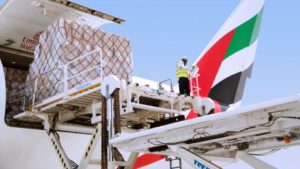
- Carrier now operating scheduled cargo flights to more than 50 destinations globally with multiple weekly frequencies
- Operating increasing number of charters to transport relief supplies and medical equipment
- More than 33,000 tonnes of perishables and 1,700 tonnes of pharmaceuticals brought into UAE since January
Keeping up its unwavering commitment to deliver food, medical supplies and other essential commodities to markets across the world during the Covid-19 pandemic, Emirates SkyCargo has rapidly scaled up its cargo services to connect an increasing number of global destinations. The air cargo carrier currently operates flights to 51 destinations globally, out of which 19 cities are served by the Emirates SkyCargo Boeing 777 freighter aircraft offering up to 100 tonnes of capacity per flight and 38 destinations are served by dedicated cargo flights on Emirates’ Boeing 777 passenger aircraft offering up to 50 tonnes belly capacity. (For a full list of destination and schedules, visit the Emirates SkyCargo website)
Nabil Sultan, Emirates Divisional Senior Vice President, Emirates, said: “We have particularly ramped up operations for transporting cargo in the bellyhold of our passenger aircraft in the last two weeks. Emirates SkyCargo has been expanding its network on a daily basis and some of the latest destinations for our cargo flights on passenger aircraft include Bangkok, Casablanca, Johannesburg, Singapore and Taipei. Air cargo remains the fastest means of connecting essential supplies to those that need them and our expanded network allows for increased connectivity across different global origins and destinations.”
During the week ending 4 April 2020, Emirates SkyCargo had operated more than 160 flights on its freighter aircraft and close to 90 flights on its passenger aircraft. The following week, the air cargo carrier had operated close to 160 flights on its passenger aircraft alone.
In order to streamline operations and cut costs under rapidly changing global conditions, Emirates SkyCargo has also transferred all its cargo handling operations in Dubai to Dubai International Airport. Watch a video about the change to Emirates SkyCargo’s hub operations.
Charter Operations
Over and above scheduled operations, Emirates SkyCargo has also operated an increasing number of special charter flights for cargo both on its freighter and passenger aircraft. Since the start of April, the carrier has executed more than 30 charter flights connecting over 20 global destinations. The main commodities transported on the charter flights are medical supplies including face masks, protective covers, sanitisers, equipment for hospitals in addition to pharmaceuticals, raw materials and spare parts.
In the space of just three days between 7 and 9 April, some of the notable charters operated by Emirates SkyCargo included
- 100 tonnes of masks and other protective supplies transported from Guangzhou to Dubai on 7 April. This was part of several other charters to bring medical supplies into the UAE.
- Close to 100 tonnes of medical supplies including masks and other protective equipment transported on 8 April from Shanghai to Mumbai on the Emirates SkyCargo Boeing 777 freighter
- 100 tonnes of protective equipment transported from Shanghai to Dubai on a Boeing 777 freighter on 8 April. The supplies will then be flown to Bucharest on 10 and 11 April on four separate flights on the Boeing 777 passenger aircraft.
- Over seven tonnes of medical supplies transported to Los Angeles on 8 April in the belly hold of an Emirates’ Boeing 777 passenger aircraft. This was also the first dedicated cargo flight on a passenger aircraft operated by Emirates SkyCargo to North America.
- Close to 1 million Covid-19 testing kits to be transported to Sao Paulo on 9 April. An earlier shipment containing 500,000 kits was transported on 30 March.
Emirates SkyCargo has a dynamic and responsive team handling charter operations. In some cases, the team has been able to deploy aircraft within 24 hours of the original request coming in for a charter operation.
Emirates SkyCargo global teams go the extra mile
Both at Hub Dubai and across the world, Emirates SkyCargo’s staff have been working hard to ensure the safe and efficient transport of cargo despite challenging conditions.
“Under these unprecedented conditions, our staff are fully committed to making sure that that medicines, medical equipment, food and other necessary commodities for people and businesses around the world are being transported without any compromise of the high service levels that differentiate Emirates SkyCargo from other players in the market. We are truly grateful to the non-stop efforts of our team that contribute to our successful operations,” added Sultan.
Some of Emirates SkyCargo’s stations including Hong Kong and Amsterdam have had to manage increased freighter operations with Hong Kong managing more than 30 and Amsterdam managing more than 16 freighter flights a week.
Emirates SkyCargo’s team at Karachi were even able to break a global record for maximum cargo loaded in the lower deck of a Boeing 777-300ER passenger aircraft. The team helped transport just under 62 tonnes of cargo, primarily food items including vegetables, fish and meat, on a single flights bound to Dubai.
Bringing food and medical supplies to the UAE
From across its global network, Emirates SkyCargo has helped import more than 33,000 tonnes of perishable items and more than 1,700 tonnes of pharmaceuticals into the UAE since the start of the year. Food items are brought in from several markets including Australia, India, Kenya and Pakistan.
“With our expanded network now covering more than 50 global destinations, we are able to ensure a constant supply of food and medicines from across the world into the UAE. Emirates SkyCargo remains committed to maintaining and constantly replenishing vital food and medical supplies in the country,” emphasized Sultan.
Globally, the air cargo carrier has transported more than 93,000 tonnes of perishables and more than 20,000 tonnes of pharmaceuticals. The carrier has also transported more than 3000 tonnes of medical supplies for combatting Covid-19 across the world.






